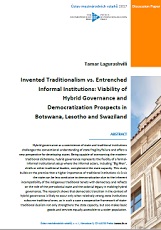Invented Traditionalism vs. Entrenched Informal Institutions: Viability of Hybrid Governance and Democratization Prospects in Botswana, Lesotho and Swaziland
Invented Traditionalism vs. Entrenched Informal Institutions: Viability of Hybrid Governance and Democratization Prospects in Botswana, Lesotho and Swaziland
Author(s): Tamar Lagurashvili
Subject(s): Governance, Government/Political systems
Published by: Ústav mezinárodních vztahů
Keywords: Hybrid governance;
Summary/Abstract: Hybrid governance as a coexistence of state and traditional institutions challenges the conventional understanding of state fragility/failure and offers a new perspective for developing states. Being capable of overcoming the modern-traditional dichotomy, hybrid governance represents the fluidity of a formal-informal institutional setup where the informal actors, including “Big Men”, chiefs or other traditional leaders, complement the state capacity. This study builds on the premise that a higher importance of traditional institutions vis à vis the state can be less conducive to democratization due to the inherent incompatibility of the indigenous traditional tenets with democracy and reflects on the role of the pre-colonial state and the colonial legacy in molding hybrid governance. The research shows that democratic transition in the context of hybrid governance is likely to occur only when relatively strong state institutions subsume traditional ones, as in such a case a cooperative framework of state-traditional dualism not only strengthens the state capacity, but also makes basic goods and services equally accessible to a wider population.
Series: IIR - DISCUSSION PAPERS
- Page Count: 48
- Publication Year: 2017
- Language: English
- Content File-PDF
- Introduction

